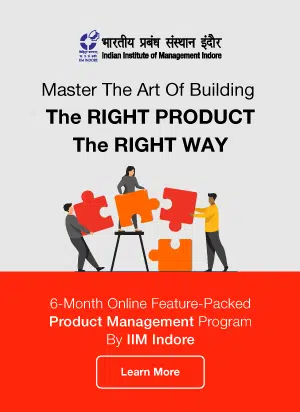Types of Product One Must Be Aware Of In 2021
Introduction
A product forms the basis of the marketing mix of a company.
- But What is a product and what are the four types of products?
- Who are Product Managers?
- What are the 7 types of product a product manager encounters in career?
Q1. But What is a product and what are the four types of products?
Ans: In simple terms a product is an item offered for sale – – it can be something physical (a pillow), a digital product (Microsoft Office, an ebook, or a streaming video), and can also be a service (consulting on how to learn core Java).
Every product is manufactured at a cost and is sold at a price, whose trend depends on the market. dynamics..
However, a product can even just be an idea (a patentable algorithm).
Also, a product can exist within another product. Eg. A ballpoint pen might have replaceable ink cartridges – – both the pen and the ink cartridges within the pen are products.
Consumer products can be classified broadly into four types:
- Convenience: These products are bought routinely and involve very little thinking. These products often inspire brand loyalty.
Eg. Newspapers, toothbrush, matchbox, etc.
- Shopping: They are less frequently purchased and consumers need efforts, planning, and research to decide and compare brands. They are of two types:
- Homogenous products: When deciding to purchase, price turns out to be a big factor. These products exhibit similar features in terms of quality, price, brand image, etc. Eg. rubber tyres.
- Heterogeneous products: They can be quite different and require considerations other than price. They have different features such as size, color and style. Eg.refrigerator, laptop, etc.
- Specialty Products: They have unique qualities and are brand specific. Here customers generally look for high-quality, luxury items with a specific reputation.
- Unsought: They are either the ones a consumer doesn’t know exists or would only buy them under some special circumstances. Examples: a cemetery plot, life insurance policy, a new software, etc.
Besides, the list of product types can include:
- Durable Products,
- Non-Durable Goods,
- Industrial Products,
- Goods, Services and Experiences,
- Primary Goods,
- Semi-Manufactured Goods,
- Natural Goods,
- Agricultural Goods,
- Manufactured Goods and so on.
Q2. Who are Product Managers?
Ans: Product managers (PMs) are ambassadors of the types of products in which they are involved from conception to their final launch. They must be able to champion different types of products, to ensure their timely launches.
The job of a product manager often sets the strategy for the types of new products to be launched.
In addition, a PM must be able to discover market cycles to position a product at appropriate marketplace platforms.
Startup products need a bit more shepherding from the time of initial conception, by the PMs.
Q3. What are the 7 types of product a product manager encounters in career?
Ans: PMs manage products of all shapes and denominations. Let us summarize, 7 – types of products, a PM generally encounters:
- SaaS or B2B Products: Software as a Service (SaaS) applications and B2B apps, cater to the needs of other companies. Their market, though smaller and competitive, can bring substantial profits, if marketed in a smarter way. It is a given fact that B2B PMs should have even better business acumen than B2C ones; because they are pitching to people who are very concerned about their budgets. Some examples of B2B products include productivity software (Salesforce), online ads, virtual testing environments, etc.
- Mass Consumer Apps having mass appeal: Facebook, Instagram, Tinder, Deliveroo, Airbnb, Uber, etc. What do they have in common? Their mass appeal, isn’t it? In such cases from a minimum common denominator (which need not be excessively simplistic!) perspective, PMs should strive to build a platform that is both attractive and effective for users.
- Additive Features: Some PMs might have their first assignment pegged on working with an existing large project that is divided into ‘features’. In such cases, PMs are obviously not really in charge of “a product from beginning to end”. However, it has been that many times, a singular element within an entire product can have the chief USP. Eg. Google’s revolutionary “backlink” system which started as an internal tool, later provided the springboard for the growth of one of the world’s largest IT companies. In such an ecosphere, though a PM might see himself/herself as a spoke in a large wheel, but some “functions” may turn out to be one of the most important aspects of successful digital operations. Eg. “Cart” mechanism for e-commerce websites…
- Early Stage Products: PMs working with startups may encounter products, where the team is often aiming to get a minimum viable product (MVP). Speed is a deciding factor here, and PMs must focus on just bare essentials, since launching a product and getting answers will help the team to improve its performance. PMs who can comfortably handle uncertainty and like working in a fast-paced environment, are not afraid to cut out entire swaths of features, to quickly deliver the MVP to the customers, will excel in this role.
- Internet of Things (IoT), Physical and Machine Learning Products: As the Internet of Things continues to take the globe by storm, more and more companies are trying to leverage this technology to grow their business. However, some companies are still struggling to build a tailored IoT solution due to the lack of availability of skilled manpower. The challenge for PMs here is to make each featured work together, complement each other, and avoid the pitfalls of siloed development. PMs also have to deal with privacy issues, as it is emerging to be a sort of Achilles’ Heel for certain companies that are unable to guarantee data safety.
- Marketplace Platforms: The function of a PM here would be to limit transaction costs as much as possible, following the dictum “build it, and they will come”. This is one of the few cases in Product Management where experienced people from sales backgrounds or marketers are at an advantage, who more than tech knowledge has the business acumen to understand how demand-supply, currencies, the psychology of consumers, etc work, going beyond the traditional methods.
Conclusion
What types of products every Product Manager is likely to encounter throughout their careers, will always be a difficult question to answer, but we can get some hints by grouping them in terms of usability and scalability. Whatever sector they are into, Product Managers should always try to strike a good balance between risk-taking and planning, keeping in mind the legacy of an enterprise.
Interested to learn all about Product Management from the best minds in the industry? Check out our Product Management Course. This 6-month-long program takes place online through live instructor-led sessions. It is the only program in India that offers the ‘Bring Your Own Product (BYOP)’ feature so that learners can build their product idea into a full-blown product, and go through an entire Product Development lifecycle. Not only this, but this is the only program in India with a curriculum that conforms to the 5i Framework. Post completion, learners receive a joint certification from the Indian Institute of Management, Indore, and Jigsaw Academy.



